Real-world cost savings on variable speed HVAC systems?
Has anyone gone from an older single speed system to new variable speed and tracked utility cost savings? We have a 3,900sf house with one 3.5T and one 3T Trane single speed AC/ 80% gas furnace. Both are original, so they're 28-29 years old (still work fine). Surprisingly our bills aren't even all that high as it is, and i still haven't even programmed the thermostat since moving in 9 months ago! They just run for days on end until we change them 😳 Our worst bill was about $600 in the winter, but that seemed to get really bad when we turned on the 3rd HVAC unit we have for our Florida room (3T carrier HE gas furnace). Smallest bill was under $200. This is gas and electric for the entire house (PECO for Philly suburbs).
We're concerned these units aren't going to last much longer. 3 decades is crazy long for HVAC systems, much less builder-grade systems (though it's surprising Trane was builder-grade back then). We got a couple quotes on new Trane systems from certified trane installers, and they were like $20k-30k per unit 😐 Granted, i told them i only wanted dual speed or variable, but those are for 16 seer to 20 seer systems with equivalent HE gas furnaces. That's a lot. It isn't even that big of a jump between different models it seems. Even the lower end ones are expensive. I was originally quoted a single speed and i think that was still pushing $20k.
So my question is, is it worth it to spend the extra on the variable speed systems? I've heard the efficiency ratings are grossly overinflated, but I'm also coming from a 28+ year old non-HE single speed setup. Just wondering what kind of savings i can expect every month. Anyone ever do a cost comparison before and after?
Comments (84)
Austin Air Companie
last yearRay,
Your links don't provide any useful insights and I don't think you have any to offer, but wanted to give you a chance to explain.
Charles, I'm a capitalist. We'll let market forces dictate whether what I say makes any cents.
(pun intended)
I know these really simple terms I use most who grace the pages of this board can read between the lines.
OR drop $30-40 grand on whatever. Your choice.dadoes
last yearMy neighbor had geothermal installed 13 years ago. The ground loops are vertical in his front yard. No pumping/refreshing of the groundwater has been done. There has been two repairs that I'm aware, related to the loop circulation pump. He also has a heat recovery loop into his water heater. Normally has the water heater turned off and relies on the geothermal to heat it.
Related Discussions
is 2-zone hvac/ac system energy saving?
Q
Comments (8)I thought it was minimum of 3 zones up to 5 zones. anyway, as to savings... as you mention not heating/cooling some areas like living are at night has a savings. comfort is a great thing with zoned systems because you can control temps by tstats rather than one tstat controlling whole house. eventually all motors fail. motors on zone dampers are not excluded. any early failures would be covered under warranty & you may have to pay labor to change. you'd have to weigh cost of zone equipment control board, motorized dampers & multiple tstats. against cost of install without zoning. factor in things like vs ahu's, two stage equipment etc to get the numbers to compare. another issue is getting a contractor with experience in zoned systems. I've always found a zoned system to be great & homeowners love it...but if the contractor hasn't done a zoned system, or uses a different brand than they are used to..it can be a disaster. in any event, compare the numbers shop for experienced contractors & get opinions/bids from them. it will be easy to tell who understands zoned systems & who doesn't once you talk to a few companies. best of luck....See MorePl.help to choose right HVAC system.
Q
Comments (30)nms21...while you're at it you should get the 50 gal water heater. At 3000 SF, I assume you have 4 Bedrooms..some day if you sell the 50 gal might be attractive. I sure do prefer having the extra in my house on those days we all want showers around the same time. I doubt it could be much extra $. My quotes were from Hutchinson, P R Sanders,Bovio and Monday is Black HOrse Pike Plumbing and Heating. I sent BHP plumbing and heating one of the quotes from one of the first two, but I took out all the prices and names. I would like to see what a smaller outfit prices for the same equip. They all have A+ bbb ratings. I got them off the njcleanenergy website and all have done a good amount of jobs under the program. One of them quoted me 13244 after all rebates for the Carrier Infinity 98 gas furnace and infinity 17 2-stage air eligible for the 1100 rebate. That was with a 50 gal direct vent hot water heater and attic sealing. I just don't think I need that hvac. Sounds like a "cadillac" system..I hope he emails me back with something more reasonable. When he was here I thought his would be one of the lower prices....but his quote is for different stuff!...See MoreNeed expert guidance for a new HVAC system
Q
Comments (34)Guys, I have gotten stuck in between two systems for my final decision. Please help me out to pick the right one. I am trying to decide in between these two ; #1 - Bryant 6129135 Active Systems BRYANT HEATING AND COOLING SYSTEMS PERFORMANCE 13 PURON HP BRYANT HEATING AND COOLING SYSTEMS 286BNA048****B CNPV*4821AL*+UI 1300 1040 315(A,J)AV048090 45500 11.50 15.50 46000 8.20 29600 1 HRCU-A-CB 355 1140 also includes - Evolution touchscreen thermostat and comes with free Bryant Air purifier - one year test drive - I don't know how it works but they say they will provide 100% refund if I am not satisfied with the system within a year from the installation date #2 - Trane 5768796 Active Systems XR17 TRANE 4TWR7048A1 4TXCD063BC3 1370 1090 *UD2C080B9V4 48000 12.50 17.00 45500 9.00 30400 1 HRCU-A-CB 342 1077 Yes Not include thermostat. will use exiting HW VP IAQ includes GPS-2400 plasma air cleaner price wise the Trane is roughly $200 more expensive than the Bryant after the tax credit is deducted Both contractor will add two returns and one supply and will fix the distribution issues in my current duct work. Based on the notion I got; both contractors are very capable and have very good reputation I am more inclined to Bryant due to evolution controls. I do know Trane is very reliable and efficiency wise it is a little more efficient compared to the Bryant system. to me $200 difference in price is very negligible. I just want to make right decision. I got stuck! PLEASE HELP......See MoreNeed Help for Replacement HVAC System
Q
Comments (38)Thanks, @mike_home and @tigerdunes. I followed up on your advise and asked AS dealer to quote me the 60K platinum furnace (originally, he had quoted an 80K platinum one). No change in price! So I can get either one, but they will charge me the same $$! The other Trane dealer that I have short listed is quoting me 60K XV80 furnace, with the configuration @tigerdunes suggested in the previous post. However, I did notice that the Evap Coils they have quoted are different ones: 4TXCB006DS3 vs. 4TXFH036CZ3. The Trane dealer told me that these are two different types of coils (Box Coil vs. Slab Coil, respectively). With the second one, the 60K XC80 furnace (*UD2C060ACV3) will give 13.00 / 16.00 rating, qualifying for tax credit. So my final (hopefully!) questions are: If there is no cost difference b/w 60K and 80K furnace, what are the negatives for opting to go for a bigger furnace (to get the tax credit)? Is it worth going to XC80 furnace (60K or 80K) to get the tax credit as long as the cost difference is less than $300)? Would I get any benefit of the "communication capability" of the furnace or to get any benefit, I also need to upgrade my outside unit)? Which of the above two coils (DS3 vs CZ3) is better - design / functionally / performance wise? May be I am nit-picking here, but lack of knowledge/expertise is making it difficult to figure out a "right" combination. The dealers here are not very helpful. They just want to use the same components that they have used in the past. I sincerely appreciate everyone's help here. You guys have been God-send to help me navigate through this minefield of HVAC land!! Somehow, a simple Thank You does not seem adequate. But unless I can think of a better way to express myself, that's all I have. So, Thank you all, esp. @mike_home and @tigerdunes....See Morefsq4cw
last year“Not at all but you have to appreciate that your credibility is limited because you always suggest the same one approach for everyone everywhere. Another funny thing is that you don't recognize the bluster and hype in your tone. Replacing HVAC systems is an expense, not an "investment", a word salesmen like to use.”
My credibility on this website is of no consequence as I have not registered as a ‘Pro’ and am not looking for business, credibility, validation or anything else as this is not where I work or live. I contribute technical knowledge that can be verified elsewhere, used or not use.
“Selling geothermal systems does provide a rate of return to the seller, buying them often does not.”
And how would you know this? The return on investment is exactly why developers of residential, condo and commercial projects are going geo, because of their numbers (developers/investors) - not because someone is trying to sell them something, although they do like the technology. Their math and their bottom lines are the determining factors.
BTW: I’m sure PV Solar Panel arrays are never sold as an investment. That would be unethical according to your logic, wouldn’t it.
“Often, it is a too expensive solution for which equally competent alternatives at much lower overall costs, all in, are available. Especially someplace where the electricity rates are as low as for Mr. Fehr.”
That might be because it’s beyond the budget of the purchaser. I always qualify my responses being based on the technical not the financial on this website. My contributions here are based on technical information, not financial advice. Each person knows what’s best for their situation. As for ‘equally competent alternatives’? How are they equal with regard to efficiency, flexibility or life-cycle?
Regarding electricity rates, few places in North America have rates as low as ours and even so we pay less to heat and air-condition than anyone I know with a similar size home regardless of energy source. The only ones that come even remotely close as ones with no garage and that are away for much of the year. I know what we pay, I know what neighbours and many others pay but that is anecdotal and hearsay for this site. With records going back 20-years, I clearly see the advantage of our choice regardless of electrical rate.
As usual you can’t help but comment on anything I write and with the brightness of a 10-watt incandescent bulb shed no new technical light of any value.
“you always suggest the same one approach for everyone everywhere.”
Patently false - read 1st comment - no mention of geothermal !
multi-split ductless heat pumps
IMPOSR
fsq4cw
last yearlast modified: last yearRe: suburbanmd
That is not a normal condition. Something is wrong with the design, function or both of your friend’s ground heat exchanger. Any properly designed ground loop should be as efficient as any other.
Water table should not influence efficiency to the point of any serious loss of efficiency unless you have an open loop vertical well and have not drilled deep enough and the pump is no longer completely submerged. This might happen during a prolonged drought, a neighbour drawing excessive amounts of water nearby from the same aquifer to water lawns or for other uses.
Your friend’s HP might not have the proper GPM flow rate required for the size and Btu of this HP. Flow rate, Entering & Leaving Water Temperature should be verified. Our geothermal heat pump has a ‘soaker hose’ installed down the borehole just in case of drought. It monitors efficiency and is designed to automatically rehydrate the bore field automatically if necessary. I think that might be more necessary during air-conditioning mode when we’re rejecting heat to the ground. To my knowledge it has not been used in the almost 20-years that we have this geothermal heat pump. I know we have good ground water streams flowing through fissures to our boreholes that does increase COP efficiency. This became apparent during the vertical drilling processes.
Re: dadoes
“Normally has the water heater turned off and relies on the geothermal to heat it.”
Completely accurate, very often the active elements in the DHW tank can be turned ‘OFF’ during the summer while air-conditioning with geothermal. In addition to no defrost cycles in the winter, during the summer the heat energy extracted from the envelope of the home is dumped into the DHW tank before going back into the ground loops. This is something else that makes geothermal the technological winner over air-to-air heat pumps - every time !
IMPO
SR
Elmer J Fudd
last year"My credibility on this website is of no consequence"
That's why your comments trigger disagreements.
"The return on investment is exactly why developers of residential, condo and commercial projects are going geo."I think this is puffery, untrue. Cite examples and locations where this groundswell of activity is taking place. You're right about math, though. The name of the game for developers is to spend as little as possible on costs to maximize profit on sales. The standard they build to is typically minimum code requirements. Needlessly increasing costs for expensive HVAC equipment like what you always advocate, when much cheaper alternatives with the same functionality are available, doesn't get recovered in sales prices. And so isn't widely done, as far as I know. Certainly not in my area.
"As for ‘equally competent alternatives? How are they equal"This is an easy one. People want heat when it's cold and cooling when it's hot. How it gets produced is something few concern themselves with. And are rarely eager to pay many tens of thousands of dollars extra for one particular type when, in the end, what they get is the same. That makes no sense.
"I’m sure PV Solar Panel arrays are never sold as an investment."PV panels are more akin to an investment for people who plan to live in their homes long enough to recover the expenditure, than are geothermal systems. For the latter, a rate of return is not always recovered.
In my sunny area with mild temps, the payback from solar panels is very likely to be realized. Another factor at play, though - some people do it because they think it's cool, something they want to have. It's cheap enough to do and with available "leasing" products, I could have solar panels on my house for no cost at all. Solar panels and an air source heat pump in many areas will still be much cheaper to acquire and operate than what you always advocate and the return on the outlay will be more substantial and realized sooner.
Hold the personal insults please, that similarly doesn't contribute to your reputation here.dadoes
last yearI mentioned the neighbor's geothermal when I was soliciting my replacement. The contractors said no one is any more asking about it around here.
Charles Ross Homes
last yearlast modified: last yearRay,
It doesn't surprise me that you can't defend your bogus assertions. Houzzers should know that your "professional" avatar doesn't make you one. Your assertions are patently false and you do houzzers a tremendous disservice by suggesting otherwise.
SEER rating is a seasonal energy efficiency ratio. The SEER ratio is calculated the same way whether the test protocol is SEER or SEER 2. SEER = seasonal cooling output/electrical energy input. The units are BTU/ watt-hours. There is no "SEER 2 formula" that differs from how SEER is calculated except in whatever constitutes Ray's mind.
The difference between the SEER test protocol and SEER 2 protocol is that the SEER 2 evaluation is performed at a higher static pressure. Because the blower consumes more energy to produce a higher static pressure, the denominator of the ratio is larger, and the ratio is smaller. To be clear, the same equipment evaluated under the SEER 2 protocol will be rated at a lower SEER rating. This is the opposite of what Ray claims when he says: "The difference is SEER 1 will be 14.3 SEER but when applying it to SEER2 it will be 15 SEER using the SEER2 formula."
Ray might be able to unbox a replacement HVAC unit faster than the next guy, but what he knows about HVAC design and equipment performance testing would fit in a very small thimble. Houzzers will be well served to weigh his advice accordingly. LOL, Ray! Roll the red herring cartoon video! LOL! LOL! Divert, deflect and bully the opposition! That's the Raymerican way!
Charles Ross Homes
last yearRay,
You made assertions that were false and you were challenged to defend them. You couldn't. So, you reverted to your usual tools: bully the poster who called you on it, attempt to divert or redirect the conversation or throw in a red herring. You made the claims--I didn't. Houzzers deserve better Ray, whether they're in Katy, TX or somewhere else.
suburbanmd
last yearfsq4cw, there might be something wrong with my friend's system's design or functioning, though it's unlikely to be attributable to lack of due diligence on his part. But his particular system's problems aren't my intended point here. It's what I realized from hearing about them.
Is it correct to say that a large drop in water table over the intended lifetime of a geothermal system will render the system worthless? Droughts are widespread these days.Elmer J Fudd
last yearPossibly, suburbanmd. There are a few different types of systems for ground source heat pumps. One is called "pump and dump", where a water well is dug and water is pumped out of the well and heat is taken from it or transferred to it by the system. Because of the effect on ground water supplies, these systems have started to become prohibited by local jurisdictions.
If your neighbor has a pump and dump configuration, rather than one of a vertical or horizontal closed loop system where the heat carrying liquid circulates in a closed system and remains, a drop of the water table could be a problem if the well's output were to become inadequate.suburbanmd
last yearlast modified: last yearSticking to closed-loop systems: fsq4cw, you mentioned a possible need to re-hydrate the bore field, which you personally haven't had to do. That would improve heat transfer between the pipe and nearby dirt, and keep the system working, so "useless" is an exaggeration, as long as there's water to spare for re-hydration. But equalization of temperature between the immediate pipe vicinity and surrounding areas would suffer in comparison to how it worked before things dried up, it would seem. Then the system would be less efficient.
Austin Air Companie
last yearlast modified: last yearCharles you make false assertions on this board all the time, yet you never clear them up either.
I belong here, you don't. All you say is based on your own opinion -- of which I have ceased caring about. You don't get your way and you become the bully.
I gave the poster a choice. Do what you should have done all along and re-read the entire thread you'll clearly see that due to climate concerns / costs etc that going with an Inverter AC may not have a pay off.
It was never an all or nothing type recommendation. Stop making stuff up. The SEER to SEER2 change means very little on paper. Except that 70% of what equipment is made to day will not measure up to the new rating.
Things Charles has never cleared up... click to enlarge.


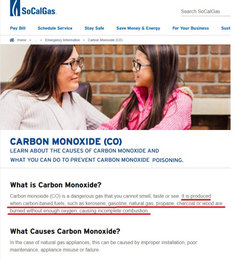
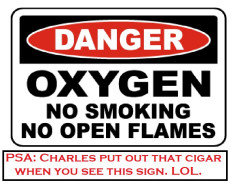

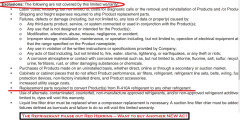
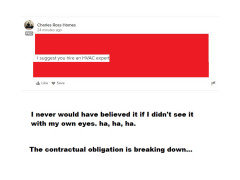
The real bully doesn't get his way again. How many more times until he finally learns?Charles go back in time and fix all these posts of yours with false assertions then *maybe* I'll be more inclined to listen to your opinion.
Otherwise the road forward gets rather lonely for you. Toodles.
Charles Ross Homes
last yearRay,
The question which you raised was about SEER ratings, specifically "Next year they switch to SEER2 --- so all these years they been testing equipment using the wrong formula? What makes this new formula right?" which I answered. You haven't made any substantive contribution to the discussion of SEER ratings or how SEER relates to SEER 2. In fact, you got the math backwards: "The difference is SEER 1 will be 14.3 SEER but when applying it to SEER2 it will be 15 SEER using the SEER2 formula."
What you've attempted to do is to belittle me and anyone else on this forum who holds you accountable for misinformation, and to divert and redirect the discussion away from the question.If you'll stick to things you actually have some working knowledge of, I think you'll find others will need to make fewer corrections and will houzzers will need to wade through less fiction to get to the facts.
fsq4cw
last yearRe: suburbanmd
“Is it correct to say that a large drop in water table over the intended lifetime of a geothermal system will render the system worthless? Droughts are widespread these days.”
No.
However a horizontal or a pond or lake loop could be more problematic than a vertical loop. It’s obvious that with a pond or lake loop that if the water level dropped sufficiently to visually expose the loops that you would know that you have a problem just looking at them because they should never be visibly exposed above the water. You might also have problems with this type of loop even before they’re exposed because they would become a danger to boaters and water skiers. There would also be a danger to the loops as the loops can be damaged by the hull of a boat or destroyed by a propellor.
A properly designed and installed horizontal ground loop should function properly regardless ground moisture under most conditions as long as it’s not installed in desert sand. Care has to be taken that the loops are buried at minimum depths as well as spacing with regard to both horizontal and vertical distance when pipes are laid out at different but parallel depths. Proper procedures have to be followed to ensure that when backfilling the earth on top of horizontal ground loops, whether linear or ‘Slinky’ that the pipes are not crushed and that they will maintain proper contact with the soil; no boulders, no voids.
Loops have to be properly pressure tested before being covered and buried in either a trench or pit before easy access for repair or modification is lost. There are also 2-other types of ground loops systems and flow centres as well, pressurized and non-pressurized. Each have their advantages and disadvantages. Regarding horizontal ground loops of any configuration my personal preference is for the pressurized variety because a pressurized loop is less likely to become crushed or compressed by debris such as rocks or boulders that have been inadvertently back filled or by heavy vehicular traffic crossing the loops. Others might think differently and prefer the unpressurized systems for various reasons and that’s OK too. Non-pressurized loops would only be found in residential and small commercial applications.
The ground should not have to be hydrated as long as good contact is maintained between the pipes and the ground and that the pipes are buried at a sufficient depth to maintain a relatively narrow bandwidth of temperature swing. However, hydration should be given some thought and consideration during construction and installation, if the ground loops are installed beneath a lawn or say a football field they can be watered. However if it’s underneath the paved parking lot of a school or a hospital that’s a different story.
Vertical ground loops of sufficient depths should not present any issues beyond proper contact with the ground. Ground water temperature is essentially derived from the ground anyway. Ground water flow past a borehole might in fact enhance performance more than just the ground or a relatively static water table, kind of like a water cooled internal combustion engine, although other factors come into play as well, such as the choice of thermal conductivity of the grout being used and whether borehole steel casing had to be installed.
Most of a vertical borehole is deep within solid rock and in fact if you drill deep enough the ground temperature starts to incrementally rise; not a big factor for residential systems. Residential systems are usually drilled to depths between 100 to 450 feet deep. The deepest boreholes I’ve personally stood on are 1,800ft deep!
Re: Elmer J Fudd
‘Pump & Dump’ has long been considered at least ‘acceptable’ based on the theory that the rejected water will eventually find its way back to the aquifer. I’ve never liked this method as my preferred methods would always be towards the most ecologically responsible. That is returning the water to the same aquifer unchanged but for a several degree temperature deferential and of a sufficient distance from the intake well. The other issue with pump & dump is how are you going to deal with it in cold climates where the above ground rejection outlet might freeze?
Always hire an accredited, well experienced (pun intended) professional for geothermal - even for residential. What looks simple is in fact not -finding that out after the fact will be expensive!
IMPO
SR
Elmer J Fudd
last yearSorry, I missed suburbanmd having specified what his neighbor had. I suspected but didn't want to guess that the horizontal trench variety doesn't rely on a high water table because they're only buried a number of feet below the surface. Someone I know has a horizontal closed loop arrangement in my arid area and groundwater is nowhere near the surface. I think he's said his trenches are around 10 feet deep or perhaps a bit less.
I agree with your describing pump and dump as the least preferable. In many areas, it's not permitted. The thing is, it's quite a bit cheaper and cost is an important consideration so long as ground source systems remain prohibitively expensive for many. Another friend has one, in a macho and thinly populated part of the country. A "keep government out of my face" place. It was a cost decision for him. I don't remember looking at that part of his installation when I've been there but it's not a frozen tundra place like Quebec so I wouldn't expect winter temps would have been an insurmountable consideration for the water discharge. But I'm not sure.fsq4cw
last yearSounds like your friend’s system is buried at a sufficient depth to ensure a good COP if all other elements are well executed as per best practices. “Quite a bit cheaper” perhaps to install, depending on the depth drilling has to be done to get sufficiently below the surface of the water table or aquifer. A properly functioning open loop vertical well system is inherently a bit more efficient than closed loop systems where COP is concerned but other factors come into play as unlike a closed loop, opened loop is not a balanced system. A closed loop system has the water coming up the loop balanced by an equal weight of water going down so that despite the depth of the borehole it’s balanced like an elevator that uses counter weights to balance the weight of the car or cage somewhat eliminating it from the equation, however there is still flow rate and resistance to factor in. As a result a smaller motor drawing less power can be used to pump the water in a closed loop system just as illustrated with the example of the elevator with balanced counter weights that doesn’t have to lift the weight of the people and the elevator car.
No such luck with an opened loop system that is always pumping the full weight of the water column. If your submersible well pump is not too far down hole you’re a winner, if your well has to be very deep the operating cost of the pump can seriously erode the savings of the system COP.
“…but it's not a frozen tundra place like Quebec so I wouldn't expect winter temps would have been an insurmountable consideration for the water discharge. But I'm not sure.”
Well, you might not have to fight off the moose and the beavers like we do and your discharge pipes might not freeze over like ours but many places still have the real concern of algae not only completely clogging up the discharge pipe but the ground water to refrigerant heat exchanger within the heat pump itself. This means possible additional maintenance costs to flush this heat exchanger and the discharge pipe with some strong chemicals. So in addition to water chemistry there is also a serious concern about water biology as well in open loop ground source systems.
I’d bet most of those reading along never saw that one coming!
Always hire the right accredited experienced professional!
IMPO
SR
Elmer J Fudd
last yearlast modified: last yearI don't know any of the technical details. I do know it's been far from trouble-free. There have been a number of breakdowns requiring warranty work, something he's found disappointing given the cost of the equipment. He's found the performance to be disappointing at times too. He's said that when the time comes to get new equipment, something he expects to need sooner rather than later even though the equipment is just a tad over 10 years old, he's going to go with an air source heat pump and a propane furnace as backup.
mike_home
last yearSo my question is, is it worth it to spend the extra on the variable speed systems?
Variable speed multi-stage equipment is more about comfort and less about lower operating costs. They are more comfortable when they are properly sized and can provide better humidity control in the summer. It reduces the the initial blast of cold and hot air when starting up and are quieter when operating on the low stage. This is the equipment I purchase 13 years ago. I think paying extra for better comfort is worth it. In my first house I had a furnace that constantly cycled on and off and was very noisy. In this house I rarely hear or feel the heating and cooling systems operating.
I've heard the efficiency ratings are grossly overinflated, but I'm also coming from a 28+ year old non-HE single speed setup. Just wondering what kind of savings i can expect every month. Anyone ever do a cost comparison before and after?The variable speed AC equipment tends to have a higher SEER because the SEER measurements were architected in that manner . Most professionals do not understand the temperature test conditions of the SEER measurements. They are not realistic in my opinion. A static pressure of 0.1 is the ideal laboratory condition. Even a 0.5 level is optimistic. I had some data of heating and cooling costs comparing my 8 SEER and 80% efficiency furnace to my 14.5 and 15.5 SEER AC and 95% furnace. There was some saving, but not as much as the SEER and furnace efficiency lead you to believe. I have a similar climate to yours in central NJ.
The prices of installed HVAC equipment is increased due to supply and demand. I suggest you wait until September to get quotes for an October installation. Prices may be a little better and installation crews are less over worked.Charles Ross Homes
last yearDepending on your climate zone, another benefit of multi-stage and vs equipment is reduced potential for mold/mildew growth by maintaining lower indoor relative humidity than single-stage systems. In my climate zone (coastal VA) I consider that worth the initial price premium.
fsq4cw
last yearMost of the talk about variable speed seems to be centred around SEER. For those living in colder climates the variable speed HPs are more likely to have higher HSPF numbers with enhanced cold climate performance and a higher more linear heat output (LAT) over a wider range of outdoor temperatures. Backup will be required only at lower outdoor air temperatures, but I’m always suspect of air-source HP need for defrost mode and I know that’s a big deal particularly in climates that have temperatures that go below freezing. Think energy, efficiency and wear & tear of the reversing process.
Variable speed systems will perform better when retrofitted to existing ductwork that in many cases was never designed to work with the low temperature output of heat pumps (without ductwork modification). Good luck finding those ideal low static pressures in the field particularly in home built before the 80’s.
IMPO
SR
Austin Air Companie
last yearlast modified: last yearSo my question is, is it worth it to spend the extra on the variable speed systems?
Variable speed multi-stage equipment is more about comfort and less about lower operating costs.
---------
For someone in a mild climate like Mike (New Jersey) this could be true. Run time is what gives you the savings in terms of Inverter Systems. It's not a good idea to call these variable speed systems because it leads to confusion.
However, if you get a quote of 30k-40k for traditional equipment as laid out in this thread (even though you live in a more mild climate) --- it may pay you dividends to compare an Inverter price to that of a traditional system. (A major US brand in the Inverter realm is almost certainly worse)
Because the Inverter will cut those power bills much more so than traditional HVAC equipment will. The SEER of the unit is merely a benchmark which is harder to track accurately on an Inverter that is constantly adjusting.
This isn't an all or nothing --- this is about giving you the best bang for the buck. If it puts you in a better position why not?
It's only about comfort: There are modes in which the machine can make it all about comfort if you want. While this will be less efficient I don't think this will reduce the efficiency to the point of a traditional AC with only 1 or 2 speeds.
A true AC inverter has over 60 speeds to choose from. It starts out lower and is continually searching. If it runs more in the 30-40% of capacity realm the electrical consumption needs for that is next to nothing when compared with a traditional AC that only runs in 1st speed. 1st speed of a 2 speed machine is 70% capacity, which is still over sized a good part of the year for a mild climate.
My Inverter AC electric bill for April 2022 (click to enlarge)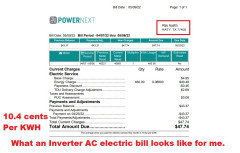
Elmer J Fudd
last yearLet's think about enough facts to understand:
- Your marginal cost for usage is 8.8 cents per kwh, not 10.4. This is well below the national average.- Current Powernext price plans shown on its site range from 15-20 cents per kwh, so you have some kind of grandfathered rate plan that will end and need to be renewed at a higher price
- Your electricity charge is about 1/3 of what I pay and is similarly a fraction of what many face. Neither here nor there, that affects your dramatic presentation.
- Do you live alone? Most of us don't. Is your house occupied during the day?
- How large is your house in sq feet?
All of these factors are needed to make an apples to apples comparison.Austin Air Companie
last yearYour marginal cost for usage is 8.8 cents per kwh, not 10.4. This is well below the national average.
I just reprinted the same number they used at the bottom of the page, only bigger so you could read it.
The higher the number goes, the better the out come in terms of money savings for me... given what I know about my previous config. a 14 SEER single speed beater.
Current Powernext price plans shown on its site range from 15-20 cents per kwh, so you have some kind of grandfathered rate plan that will end and need to be renewed at a higher price
Yeah my new renewal rate starts this month. Around 14 cents per KWH.
1910 Sqft. --- I don't drastically raise the temperature in the part of the home I use (roughly half) This house is zoned (4 zones), so I have the ability to cool areas I want on a moments notice. Usually around 74-76 during the day. 72 at night.
To make a better comparison: There's other comparisons I make on my website using older bills on my Katy, Texas AC Blog with single speed equipment versus the Bosch 18 SEER inverter. (Not even the highest efficient unit they make)
click to enlarge.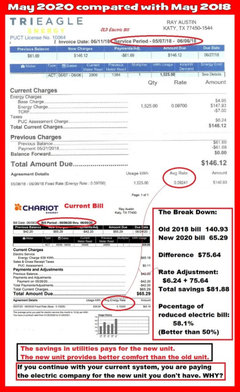
Cost per KWH: The higher it goes the more I save compared to the older less efficient equipment.
I could remake the argument you know using current bills but it's more or less the same thing over and over again. My usage / how I run the equipment from then to now has changed very little... except I am more comfortable now and have lower electric bills.
Pay attention to what I use: Older vs the Inverter--- how many KWH's am I burning? That is what you're paying for. Prices are always changing... the higher the price goes the more I am saving compared to the older less efficient equipment.
I had a 4 zone system with the older equipment I had before. I did this primarily to show skeptics like yourself. Most in the HVAC business do not go to the lengths I go to --- to show you.
Yet even after all that, some will refuse to believe. That's ok too. You're free to choose whatever you want.
I service the Katy, Texas area.Elmer J Fudd
last yearlast modified: last yearYou cool only half of a modestly sized house and your rates are going up by over 50%. Any other relevant information you forgot to mention?
Ryan Fehr
Original Authorlast yearYeah, I wouldn't say 460kWh in 1900sf running your "efficient" configuration and keeping your thermostat at a sweltering 74-76° is something to brag about.
This is my last PECO bill. We used 705kWh last month running three 30-year old systems 24/7 with AC on every day. Our house is 3,900sf. One of the systems serves a Florida room, which is massively inefficient by design, but we keep the AC on all day cause we have a cat in there. None of our thermostats are programmed to a schedule. They all just sit at 68° 24/7. My wife works from home, so she's home all day every day. Given the circumstances, I'd say THAT is something to brag about... Even though we're getting rid of the two main systems this week. The October spike was when we just moved in, so there were a lot of reasons for an electric spike that month.
Tomorrow is the day they start installing the new systems. We shall see how they fair.
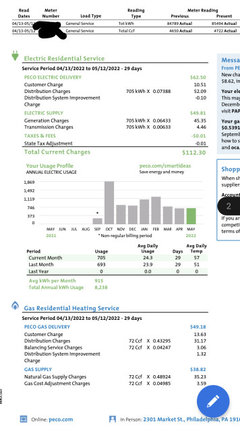
Austin Air Companie
last yearlast modified: last yearYou cool only half of a modestly sized house and your rates are going up by over 50%. Any other relevant information you forgot to mention?
Yeah, I wouldn't say 460kWh in 1900sf running your "efficient" configuration and keeping your thermostat at a sweltering 74-76° is something to brag about.LOL. This was how I ran the previous config fairly similar within a few degrees. Comfort is a mystical thing among northerners / mild climate people. I sleep at 72, it's very comfortable for me. If you think 74-76 is sweltering I got some bad news for you --- this weekend it's going to top 100F here. Feel like temps in the 108F area.
The savings are nearly always the same 50% less of whatever you are using now. I show you what I used before. I show you what I use now? Let's make it more difficult than what it is?
ERCOT is telling us here to set out thermostats at 78 so we don't go to rolling blackouts.
A modest size house? It's a 4 bedroom house, I can only use one bedroom at a time. LOL.
Your savings will be half of what you use compared to a 14 SEER single speed. (roughly) I show you my regular use in a 14 SEER unit as well as the 18 SEER inverter. Nearly every electric bill comparison is at or near 50% less use for me. (sometimes well over 50%)
As it heats up, the unit runs more creating bigger bills. I was hitting close to $200 a month with the old single speed beater in the hotter months. 50% less than that = what?
If the price of energy goes up --- the old config might cost me $300 a month.... $400 a month?
What is 50% of 300? 50% of 400? ---- so you see how this savings thing ratchets up the higher utility rates go.
----------------------------
Even with this sweltering thing there is no shortage of people moving here. Someone posed a question to the weatherman on a news channel here...
How long is this going to last (temps in the mid 90s here as of late) --- I can hardly breathe it's so hot here? (context for you)
JJ Watt --- made a comment of things he doesn't miss from our area over here: 1. Traffic. 2. The humidity.
He emphasized that comment with: That humidity there is no joke. ( He is also from Wisconsin by the way.)
--------------------
Ryan the math doesn't always work for a mild climate. As in paying you for the whole thing to do it.
If you have electric bills of $100 a month for 3 months that's $150 a year. Mild climate problems with low use / low run time. The machine pays you by running it, that's the only "real" way -monetarily. It pays you other ways as in better / more even comfort.
If you spending 30-40K for a "regular run of the mill AC" and the Inverter AC can be had for same or less equipment cost?
So the inverter saves you $150 a year plus cheaper than the 30-40K install cost. Completely different if they were quoting you a fraction of that 30-40k. The inverter in that scenario puts you in a better position in my opinion.
For further context: My opinion is based on 28 year HVAC career of doing this for a living.Charles Ross Homes
last yearInvestments in energy efficiency improvement are subject to the law of diminishing returns. At some point, chasing efficiency gains makes for interesting cocktail party conversation, but not much economic sense.
The experience of a single user comparing the performance of new equipment with that of a "14 SEER beater" is certainly not a controlled study. It's a poor basis on which to make a purchase decision because real-world performance is a function of a number of variables including the size, orientation, and construction of the home as well as the habits of the particular user. For anyone considering a replacement heat pump or air conditioner, this calculator will provide a more objective means of estimating your savings:
https://www.seerenergysavings.com/
The calculator allows you to enter your location, cost of electricity, the efficiencies and capacities of the two systems you want to compare. For Houston, TX, changing from a 14 SEER system to a 20 SEER system produces an estimated savings of 30% annually. Assuming a 3 ton system, you'd save an estimated $200/year based on an electric rate of $.11/kWh. Again, the accuracy of the estimate is limited based on a number of variables.Ryan Fehr
Original Authorlast yearYou keep talking about this mythical cost savings as if it's some kind of guarantee. That's never the case. Usage is what matters. Usage is measurable and doesn't have all the other BS fees included. Usage isn't affected by rising prices, however usage is the single most direct measurement of the system's efficiency. Having used 460kWh in a home less than half the size of mine with a system configured and set to be efficient/green is not impressive. I don't know what "normal" usage should be, but either (a) your usage isn't that efficient at all, or (b) somehow my three 30 year old systems that just run non-stop are unbelievably efficient. The latter seems implausible.
As to climates, you seem to be under the impression that I live in the Arctic tundra or something. We are experiencing the same weather you are right now. Eastern PA is notoriously humid. Appalachia funnels all the weather straight up the east coast and over this area, so we always get a lot of rain and it's very very green around here. The air is often 'thick' in the hot summer months... Hard to breath. Having been to Fayetteville, NC and Augusta, GA in the dead of summer, it's very comparable to that kind of humidity. Temps have been high as well. Last week was mid-high 90s. This week is more mild in the mid-80s. Hitting 100+ in the summer is normal around here, though we don't typically see much more than 103-104 tops ("real feel" is a different story).
You are also being disingenuous about the new equipment I bought. First of all, I got 2 systems for that price, not 1, so you can basically cut that number in half right off the bat when referring to single system pricing like you are. Second, the XR17 AC unit is hardly 'run of the mill' AC. It's not modulating, no, but it's still a 2 speed unit that's near the top of Tranes offerings. Our S9V2-VS furnaces are the 2nd best furnace trane offers, just below the modulating furnace. Now I know you're not trying to suggest Trane is somehow behind the times with technology. That would be a ridiculous assertion. Furthermore, our pricing includes 2 Trane clean effects and 2 10-year labor warranties. All things considered, the pricing isn't outside the norm.
mike_home
last yearA true AC inverter has over 60 speeds to choose from. It starts out lower and is continually searching. If it runs more in the 30-40% of capacity realm the electrical consumption needs for that is next to nothing when compared with a traditional AC that only runs in 1st speed. 1st speed of a 2 speed machine is 70% capacity, which is still over sized a good part of the year for a mild climate.
Ray,
Can you post the model number and the product data manual which states the inverter condenser supports over 60 speeds?
Austin Air Companie
last yearlast modified: last yearRay,
Can you post the model number and the product data manual which states the inverter condenser supports over 60 speeds?
No because there are only two models, but the speeds are determined via Hertz number is dependant upon the config the machine is put in. The number of speeds or Hertz the unit is run in will change. If there is a better way to describe this simply other than speeds without going down a chorus of rabbit holes let me know...
Minimal could be conceived as anything in the 19 to 30 hertz realm.
It has the ability under certain conditions to provide 30% more capacity than rated mode it is configured in... that is why I say over 60 speeds and don't give a specific number because it will vary. That is the whole point in a "load matching matching" it attempts to match the load of the structure.
Hertz or electrical rating is used to determine speed. I say speed for simplicity to help you understand. The higher the Hertz the faster the motor runs. It ramps by 1 hertz up and down.
If you want to learn about it and understand better than that?
That's what trade schools are for Mike.
--------------As to climates, you seem to be under the impression that I live in the Arctic tundra or something. We are experiencing the same weather you are right now.
But for how long? Here we likely won't see any let up until after Thanksgiving in November and sometimes longer than that.
How warm is it there by the end of September? Remember I am from Wisconsin. I know how short those northern summers are.Ryan Fehr
Original Authorlast yearAustin,
You're the one who threw out the number 60, but now you're saying there is no number of speeds? You're contradicting yourself.
The equipment has a spec sheet, that's a guarantee. The spec sheet may not provide a relatively meaningless "speed" unit anywhere, but it absolutely will provide ranges of output voltage and frequency for a given input. There's a coil with a fixed amount of loops, and it sees variable current and voltage within set predefined parameters. The output is predictable by design, because it was in fact designed. And if there's an electronic controller that increments the inverter frequency by 1Hz, then the system is in fact stepped - technically - not continuous. For all intents and purposes it can be viewed as continuous, because the steps are very small, but it's still stepped. If you wanted to put an actual number on the "speed", I'm sure you could based on the electrical specifications. But what this "speed" is likely referring to is more a marketing term than anything. Perhaps that's what you're trying to get at, but you're conflating frequency and speed. You could [theoretically] have variable frequency but constant fan/motor/compressor speed, so the terms aren't interchangeable.
I may not have 20+ years HVAC experience, so I'm not at all familiar with the equipment specifications in that industry. But i have degrees in physics and engineering, so i know electrical circuits and EM field theory. HVAC systems must operate within the laws of physics just like everything else. If you're going to try to explain how a frequency inverter works, you need to at least understand the difference between electrical specs, mechanical specs, and marketing specs.
Wisconsin is not Philly. Wisconsin is much much colder than Philly. I have family in UP Michigan, which is Wisconsin climate. The summer there is basically just July. It's much different down here. September is typically very hot here. Cooler fall weather doesn't usually start until October or November.
mike_home
last yearHertz or electrical rating is used to determine speed. I say speed for simplicity to help you understand. The higher the Hertz the faster the motor runs. It ramps by 1 hertz up and down.
Ray,The Bosch inverter converts the AC power to 380 V DC, Are you saying the Bosch inverter changes the incoming AC Hertz (cycles per second) to achieve the more 60 speeds?
suburbanmd
last yearAn inverter converts DC to AC. So it seems like these units first convert (rectify?) incoming 60 Hz AC to DC, and then convert it back to AC at varying frequency using an inverter.
Ryan Fehr
Original Authorlast yearI had no idea just how much more massive these units were. Good God! ὣ3

Elmer J Fudd
last yearlast modified: last yearMy new ones were bigger than I expected too. Quieter too. The contractor said that bigger size was to gain greater efficiency. One function of the outside unit is that it's a heat exchanger, air blows out the top which sucks air through the vents on the side and past the coils along the perimeter. It's like a big, multisided car radiator with the air moving inward. The coolant at that point is hot in AC mode, which is why you feel hot air blowing out the top. The larger the "radiator," the more heat can be discharged to the passing air passing through and out the top.
Remember to keep nearby bushes trimmed back at least a foot or two so as not to block airflow.
Ryan Fehr
Original Authorlast yearYeah no doubt it's for efficiency. I just didn't realize they had gotten this big. They're seriously enormous. We had to completely cut out one bush and trim back half of another just to get the unit in. But we'll need more trimming on the backside. We're completely redoing the entire landscape anyway, so we may just totally remove these bushes and plant smaller ones in place.
dadoes
last yearMy XR-17 is essentially the same physical size as the Carrier it replaced but both are 5-ton heat pumps.
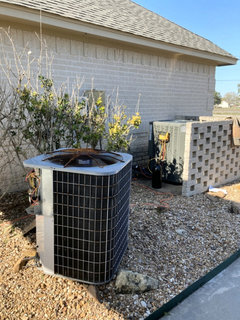
Austin Air Companie
last yearlast modified: last yearWisconsin is not Philly. Wisconsin is much much colder than Philly. I have family in UP Michigan, which is Wisconsin climate. The summer there is basically just July. It's much different down here. September is typically very hot here. Cooler fall weather doesn't usually start until October or November.
I'm sure there are differences. I was merely comparing the length of the seasons in which you actually need air conditioning.
avg Philly temps (click to enlarge)
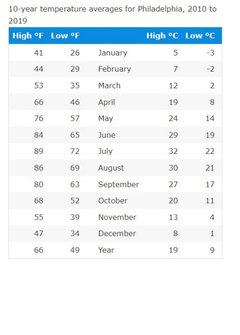
How different are those averages to what weather is right now June 2022 and versus H-town?(click to enlarge)

H-town has you beat by at least 20 degrees / some days near 30 degree difference.So this thought that everyone is going thru the same kind of weather is false. I don't have a physics degree, I do know when someone isn't being truthful.
---------------
HVAC systems must operate within the laws of physics just like everything else. If you're going to try to explain how a frequency inverter works, you need to at least understand the difference between electrical specs, mechanical specs, and marketing specs.
I said in simple terms. Why? most of my customers aren't engineers. I am here to help everyone understand not just a select few. I hate that guy all he ever does is talk down to me. < I do my best not to do that.... unless I feel you are being dishonest or attempting to throw me under the bus.
------------------
I had no idea just how much more massive these units were. Good God! ὣ3
Yeah that's how they sell you a new one in another so many years, the cost of freon (R410a if you prefer) --- The bigger the unit the more freon you need. They said the titantic couldn't sink.
Due to phase out of R410a, this will happen sooner than you can imagine. US is the only country that uses R410a. Europe is mostly in R32 camp for quite awhile now.
I own an American Standard unit of another era 2008 to be exact. The so called filter I think that lasted a couple of years at best. So I've been down that road already first hand. I put that system in my own house because that is what I was selling at the time. It's been an ok system, but I've repaired that thing more times than I can count. (freon leaks) So I know it's not a matter of if, but when.
Those systems: in my opinion are not what they are cracked up to be. Maybe you're more fortunate than the rest. But my HVAC career is filled with stories of things not working out most of the time. They don't call me if everything is working. No physics degree is going to paint that picture like any Bob Ross I know. LOL.
---------------------------------
An inverter converts DC to AC. So it seems like these units first convert (rectify?) incoming 60 Hz AC to DC, and then convert it back to AC at varying frequency using an inverter.
I doubt I could have said it better myself.
There's two machines 5 ton / 3 ton with config settings that turn them into 4 ton / 2 ton.
The speeds (number of them) ramping ability changes depending on the config of the machine. Or if you prefer... the hertz controlling apparatus is limited to a lower hertz setting.
Essentially this amounts to a 1% stepping up and down in capacity that happens at the whim of the algorithm that controls the machine.
-------------------If you are contending with higher humidity and lower outside temps the AC will over cool more than dehumidify with a 1 or 2 speed machine.
This is where the inverter reigns supreme. But many will confuse this to mean it will control humidity. Some may even compare Trane gimmickry because they attempt to control humidity from a thermostat with a setting that is often times a temperature band of 3 to 5 degrees.
If you have an inverter capable of 1% steps the capacity of the machine is greatly reduced during these cooler periods. Longer run time equals better dehumidification. You don't get longer run time from a 1 or 2 speed machine with gimmick settings.
So the outcome is over cooling, drops the temp too quickly so you either lower your temp band or you live with whatever the climate is dictating at the moment.
This last section is to help you understand why the inverter is the better choice on top of all the other arguments (cost vs operational cost) --- the only reason is because of the 30-40k install cost.
Maybe the Bosch would have come in similar cost? In my area I could beat a 30k-40k quote with one arm behind my back and deliver what I think is a better system.
I know you said you have two systems... I could still beat it in my location. I know that doesn't do you any good... but I am not just here for you. This post may get further views later, like many threads on this board.Charles Ross Homes
last year"H-town has you beat by at least 20 degrees / some days near 30 degree difference."
A month of temperature data shouldn't be confused for climate data, Ray. Climate is inferred from longer-term (30 year) averages. The design of HVAC systems for a particular locality shouldn't be based on any one month of data, either.
PA has three different IECC climate zones: 4, 5, and 6. Philadelphia is in zone 4 (mixed-humid)--which is the same as my coastal VA location. In the mixed-humid zone HVAC systems need to be designed for heating, cooling, and high relative humidity. Here are the 2018 IRC design temperatures for Houston, Philly and Madison, Wisconsin for comparison (data are listed as winter d.b., summer d.b. and summer w.b. temps, respectively):
Houston, TX 32F/94F/79FPhiladelphia, PA 14F/90F/76F
Madison, WS -7F/88F/75F
Summer design conditions for Philly and Madison aren't all that different from Houston (I know you've stated the design temperature for Houston is 95F, Ray, but system designers need both the dry bulb and wet bulb temperatures to calculate latent loads and resources like building codes provide them.) Design of HVAC systems which need to maintain comfortable indoor conditions across the temperature extremes in Philly and Madison require more thoughtful design skill than climates where the conditions are more constant. Beware of any one-size-fits-all prescription.suburbanmd
last yearCharles, I think Ray is asserting that A/C is used more in Houston than in Philadelphia. Do you dispute that?
You posted design temperatures, and by implication humidity also (DB vs. WB). Those are the extremes that the system has to be able to handle, but don't say much about how hot and humid it usually is. And those are winter and summer figures. What about spring and fall? I'm familiar with the comparison between the DC area and the Tampa Bay area. Sure DC has its hot and humid summer days. But Tampa has hot and humid spring and fall also. The sun also feels a lot hotter there because of the higher angle. The Philadelphia vs. Houston comparison is similar.Charles Ross Homes
last yearThe stated design temperatures are taken from the 2018 International Residential Code which forms the core of most statewide building codes. They are not worst-case temperatures, nor should worst-case temperatures be used as design temperatures. The basis for HVAC design is a locale's climate--not weather. If weather were the basis for design, equipment will be grossly oversized most of the time with both negative operating consequences as well as higher initial cost.
As Ryan notes in his post above, an air conditioning system doesn't care about your location; it needs to maintain design indoor conditions for the given outdoor dry bulb and wet bulb temperatures and for whatever duration nature decides. Ditto for a heating system.
You are right to be concerned about shoulder seasons. Shoulder seasons--where little, if any, heating and cooling is called for--can be design challenges with respect to maintaining indoor relative humidity in a range which is both comfortable and which minimizes the potential for mold and mildew growth. Some of the more sophisticated variable speed air conditioning systems have a dehumidification mode for shoulder season. I battled mildew in a former home which is something I don't want to repeat. I opted for integrating a supplemental dehumidifier into my HVAC systems--one on each level of my two-level (coastal Virginia) home.mike_home
last yearAn inverter converts DC to AC. So it seems like these units first convert (rectify?) incoming 60 Hz AC to DC, and then convert it back to AC at varying frequency using an inverter.
I doubt I could have said it better myself.
The speeds (number of them) ramping ability changes depending on the config of the machine. Or if you prefer... the hertz controlling apparatus is limited to a lower hertz setting.
Ray,
You have removed all doubt about your knowledge of electrical engineering.
Austin Air Companie
last yearlast modified: last yearAt no point did I ever suggest "everyone is going through the same kind of weather". Not even close. In fact, I was....
click to enlarge...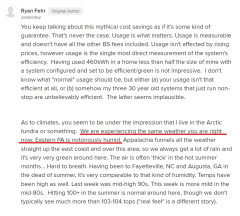
So I guess we got another engineer who has trouble remembering what they say... how ironic.Even after I highlighted it in a previous post and responded to it. What are your words exactly?
We are experiencing the same weather you are right now. When did you say it? yesterday.
From a utility billing standpoint, climate is irrelevant. A month of 90° weather is the same anywhere you are. Your equipment has to work just as hard if it's in Philly or Houston to cool a house and remove humidity. It doesn't know or care what the geographic location is.
Not really if you look at the whole picture. If you're only going to look at part of it sure... you could easily say there is no difference.
Run time / number of cycles all contribute to wear. If you use an AC for 3 months / maybe marginal for another month... compared to an area that uses it nearly triple that amount. Maintenance is another part. The equipment I pull / replace is often times full of dirt. If coils are full of dirt how hard will the equipment work in 100F heat?
Sure I could have pulled an average for Houston, but that doesn't come near to explaining the heat we are having right now. The comparison was to heat right now, the 10 year average to philly was to show how far away you are from "norms" right now as in only yesterday.
Anyone looking at the current heat H-town is having would realize these aren't normal temps. I guess Ryan could argue he's not anyone. LOL.
It's pretty amazing that you cannot seem to see irony in the remarks you make or have the capacity to self-reflect. You think you're being talked down to? My last post was in response to another one of your self-aggrandizing and condescending posts which was in part directed at me. You've taken a number of jabs at me throughout this thread because I haven't necessarily subscribed to whatever the hell you're trying to pedal. You repeatedly ignore critical information and fabricate other details
I have someone telling me I am not an electrical engineer, I have another proclaimed engineer who says Philly and H-town weather is virtually the same thing "right now" and that equipment is going to work just as hard as where ever in the world they may be right now.
It's ok for you to be condescending to me but harsh my mellow when I do it to you? If someone drives with their brights on do you not flick your brights back at them? Or are you one of these guys who drives with sunglasses on at night?
Self-aggrandizing. The subject we are on, is what I do for a living. For some reason you think I am only talking about myself? Merely talking about my experiences in working on equipment that you are paying a small fortune for. But you want something with a "track record". A track record is important, because a trane doesn't run without one.
Cost of ownership: it's higher with a Trane. Yeah this is more self-aggrandizing. It's not telling you anything you need or want. 30-40k for two systems up front on top of that. Utility bills that will be higher and? The list goes on... But it's just me self-aggrandizing pay no mind to it. What could I have possibly learned over 28 years of doing this for a living? How to self-aggrandize on a forum board. Nice. LOL.
You have your opinion based on what? How long will that last? 1 repair? I've gone down that trane track. I still go down it on occasion "for others". I love Tranes but for different reasons than you think. LOL.
----------------------
Charles, I think Ray is asserting that A/C is used more in Houston than in Philadelphia. Do you dispute that?
LOL. Yeah so we can start comparing Virginia to H-town weather as well. "right now". ha, ha, ha.
---------------------
Ray,
You have removed all doubt about your knowledge of electrical engineering.
Thanks Mike_home I don't go on Air Conditioning & Heating forum boards to pretend to be something I'm not. I am licensed to repair HVAC systems. No where in those licensing requirements does it require me to be an electrical engineer.
Reminder this is Air Conditioning & Heating, not electrical engineering. I don't need an engineering degree to fix an air conditioner. I have fixed engineer's air conditioners in the past, still occasionally do so now.
Right tool - right job. The word is still out on what kind of tool you are Mike.
Charles Ross Homes
last yearI only regret that I have but one "like" to give to Ryan's comment above (apologies to Nathan Hale.)
Austin Air Companie
last yearCuz you are here for likes. I am here for business.
Yes, we have standards to uphold. We love likes from strangers we will never meet.
Me I have customers. Capitalist. Nothing personal, just business.
(How to read between the lines... I make it so easy for you -- the reader who doesn't need to involve themselves in politics of a forum board.)
I service the Katy, Texas area.Ryan Fehr
Original Authorlast yearYou're a complete clown, Austin. You just can't help but cherry pick parts of people's posts and selectively omit the parts that give context. You're digging your own grave and [somehow] don't even realize it. Maybe that's why you're here... to try to conjure up business which you've otherwise killed locally due to your grandiose delusions about being the best HVAC tech in the world. There's only so many bridges you can burn.
Elmer J Fudd
last yearlast modified: last year"I am here for business."
Maybe so but I can't imagine that anyone encountering your typical comments here would ever want to call you.
This forum used to be visited by HVAC industry pros who contributed to conversations. To use Ryan's word - pros who, unlike the two clowns who have passed through in this thread, were polite and willing to share their broad knowledge and offer solutions and observations that were relevant to questions posed. I'm thinking of people like Tiger Dunes, energy_la, uDarryl, and others. uDaryl was also active and a respected participant at the HVAC forum where only pros can respond to questions. I remember reading that he'd passed away.
Only Charles Ross Homes and the few builders who pass by occasionally remain from the industry. The person behind CRH has an engineering background and can identify erroneous assumptions and information stated by the pretenders. These guys have general contractor familiarity but most not direct tradesman expertise. Thankfully they're around to provide sanity and unbiased suggestions from their years of experience.
Austin Air Companie
last yearYou're digging your own grave and [somehow] don't even realize it.
28 years in HVAC. Yeah, I suppose the grave is about the only thing I have left to look forward to other than people calling me for Freon. Woo Hoo!
In business you will have those who don't like you, just as much as you will have those that do. I could run a list a mile long of those jobs I lost. There were companies that you didn't choose to do your job. What will happen to them?
Cheer up and get an ice cream with sprinkles? No, sprinkles are only for winners not clowns. ha, ha, ha, ha.
I lost one last year, they called Sears. This year just a week or so ago they call me wanting me to come out. I turned them away, told them to call Sears. Because? The system should still be under warranty with Sears, not me. BUT: service with Sears? So you know what we're talking about.
You think you will buy this so called thing and have no trouble with it for 20 years, you know the track record of the unit you had before. But those times are long gone. This is what experience tells you. What fish do I have to fry in Philly? I don't service that area. Where in my posts did I tell you Ryan that I service Philly?
Your choice has consequences. Now on the Sears thing... if it had been longer time period say 3-4 years after... I'd give them another chance. But a system that is barely a year old? nope, I don't have a fish to fry in that scenario. I don't do warranty work for competitors.
There's a bit of information in there for you Ryan. That's what runs the gammut in this industry is Service. You can't slice it any other way.... especially in my market in Katy, Texas. Hopefully the company you chose is better than that. But I know from my lengthy HVAC career that many only talk a big game. Once the money is collected, the gimmick fades from memory.
Engineering must not consider these statistics. I am one guy serving a major metropolitan area with arguably more than 4 million people. I can only be one place at a time... yet I find the time to dig my own grave here on this forum board and do my normal job besides grave digging.
Statistics: The repair market is the biggest HVAC market. New, fairly new, kinda old, partly old... they all break. I am skilled / work on fix them all. Any brand. Any config.
I let you choose the topic...If grave digging is what you want to talk about who am I to argue about that? after 28 years what else do I have to look forward to? The roni rona, a case of monkey pox? ha, ha, ha.
There will be people that read these posts and will never respond or get involved in discussions on this board. How do you think I know this?
I talk to people. In person... people that admit they found me on Houzz.
Am I looking to please everyone? No. I couldn't service everyone if I wanted to. I am one guy remember?
Hire some help? 28 years. Does this not tell you I know what I am doing?
You know what I hear from customers? Yeah we call this company they send a guy over here. He checks things out, comes back and tells us he needs to call his boss because he doesn't know what the problem is.
OR -- they tell us this unit that is only a few years old was done wrong and we need to replace everything for $15 - 30 grand.
Now Ryan whether you read this or any other member of my fan club who likes to ridicule things I say -- twist my words, belittle me etc.... it's really not for any of you. There will be a select few who will stumble across my words. My dedication to what I do even with the naysayers and ridiculers --- yet I still persist.
28 years in this field... If someone comes to your house Ryan maybe in a few years when you have a problem and he says "whoa, not sure what is going on here, I need to call my boss."
Call the CRH? Call Mr Fudd? Call mike_home? You realize that is only 3 people out of roughly 330 million and none of them are likely to field your call. Why I am not here to get likes from strangers.
Oh Ray you're bragging now about doing this for 28 years. If you had been doing something for this long you wouldn't tell people about it --- on a place that is about what you do? Certainly not, only clowns would do that.
Well us clowns are here to keep people smiling.
I service the Katy, Texas area.
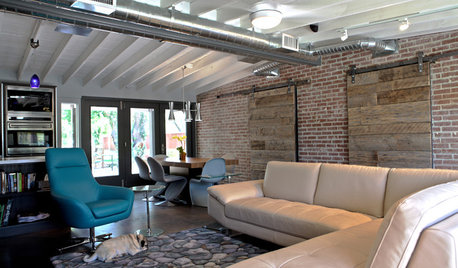

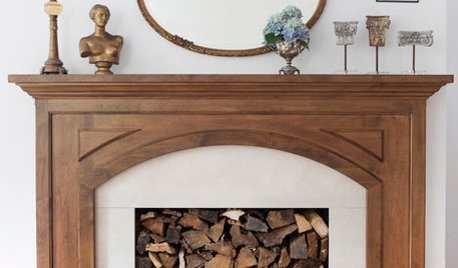
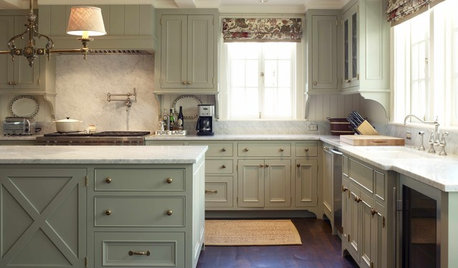
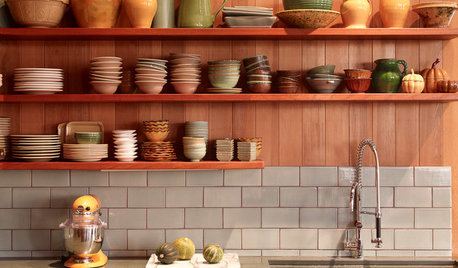

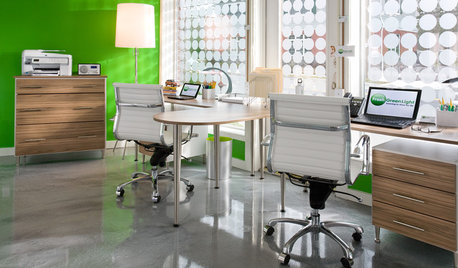
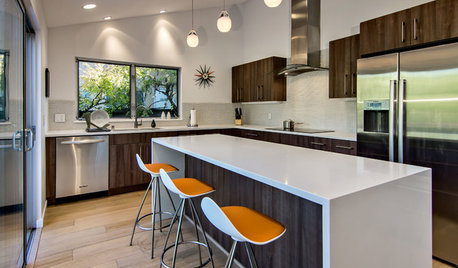

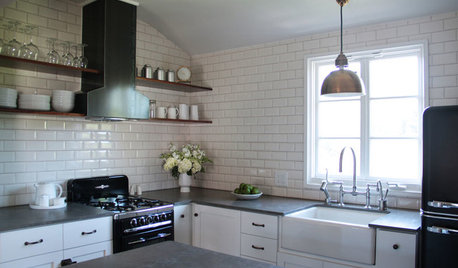





Ryan FehrOriginal Author